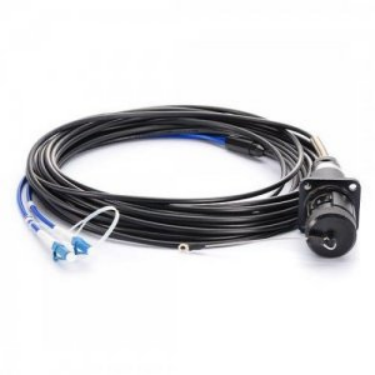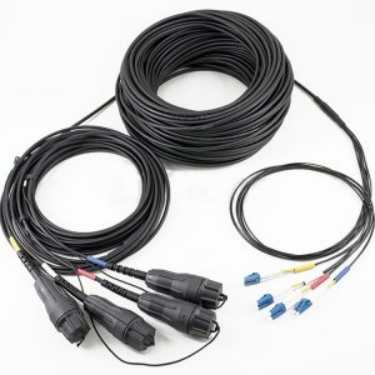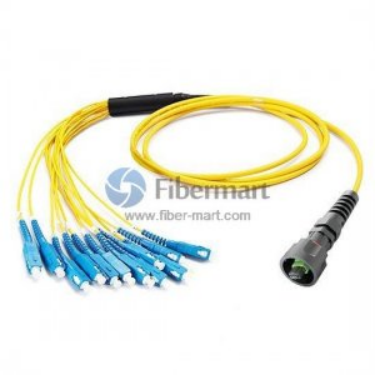Fiber optics provide the foundation for high-performance networks that can meet the growing demands of data-intensive applications. Learn the benefits of fiber optic cables.
Reasons Why IT Professionals Choose Fiber Optic Cables Instead Of Copper
With demands for data centers and networks increasing exponentially worldwide, businesses are constantly looking for appliances and servers with higher speeds and capacities. They require faster cables that can deliver advanced security capable of supporting the drastically increasing volumes and rates.
IT professionals have the choice between copper and fiber optic cables. While both types of cables serve the purpose of transmitting data, the methods differ significantly. Copper cables transmit data by carrying electrical pulses through their metal strands, whereas fiber optic cables transmit pulses of light through flexible glass threads.
This distinction often leads to fiber optics being deemed the superior choice for new or upgraded networks, despite requiring greater initial investment. Fiber optic cables not only effectively meet the bandwidth demands of various generations of computing technology but are also more future-proof than the appliances and servers they connect. The investment eventually pays off as the cost of ownership of fiber optic cables is lower than copper because they stay longer in place.
Seasoned experts at Fibermart share some expert insights into why IT professionals worldwide are turning to fiber optics over copper cables for their networking needs.
Benefits Of Fiber Optic Cables
Fiber Optic Offers Superior Speed and Bandwidth
One of the primary reasons IT professionals choose fiber optic cables is their ability to provide significantly higher speeds and bandwidth compared to copper cables. Fiber optic cables use light pulses to transmit data, allowing faster and more efficient transmission over longer distances.
Copper-based transmissions typically max out at 40 Gbps. Meanwhile, fiber optics carry data at a speed that’s been tested to be measured in hundreds of terabits per second. With the ever-increasing demand for high-speed data transmission, fiber optics offer the necessary capacity to meet the needs of modern networks.
Fiber Optic Covers Longer Distances
Fiber optic cables have a much greater transmission range compared to copper cables. Copper cables suffer from attenuation and signal degradation over long distances, requiring signal boosters or repeaters to maintain signal strength.
On the other hand, fiber optic cables can transmit data over much longer distances without loss of signal quality. This makes fiber optics ideal for connecting multiple buildings or locations within a network infrastructure.
Fiber Optic Allows Better Cable Management
Fiber optic strands boast an incredibly narrow profile, often measured in microns, which equates to millionths of a meter. In fact, the diameter of the most common fiber optic strand is comparable to that of human hair.
Despite their minuscule size, fiber optic strands have the remarkable ability to transmit vast amounts of data at significantly higher speeds and over much greater distances compared to their bulkier copper counterparts. However, fiber optic cables require protective sheathing, causing their width to increase to at least two millimeters.
In contrast, a single standard category copper cable is approximately four times wider than a fiber optic cable of comparable capacity and can only carry a fraction of the data. By utilizing fiber optics, not only does the cabling occupy considerably less space, but it also offers greater flexibility, making it easier to manage and maneuver within network setups.
The reduced size of fiber optic cables offers numerous benefits, including space efficiency, flexibility, improved airflow, ease of equipment access, and enhanced visual appeal.
Fiber Optics are Impervious to EMI (Electromagnetic Interference)
Copper cables are highly susceptible to electromagnetic interference, which can degrade signal quality and result in data loss or corruption. Common sources of EMI include electrical wiring, machinery, and radio frequency interference.
Fiber optic cables are immune to electromagnetic interference. As a result, fiber optics offer enhanced security and reduced need for retransmission, ultimately leading to a stronger return on investment (ROI).
This makes them ideal for environments with high levels of electrical noise or where interference is a concern, such as industrial settings or areas with a dense concentration of electronic equipment.
Fiber Optics are More Secure
Fiber optic cables offer enhanced security for data transmission. Unlike copper cables, which emit electromagnetic signals that can be intercepted and tapped into, fiber optics do not emit detectable signals. It is extremely difficult to tap into fiber optic cables without disrupting the transmission, making them more secure against data breaches and unauthorized access. This makes fiber optics a preferred choice for transmitting sensitive and confidential information.
Fiber Optics Offer Greater Reliability and Durability
Fiber optic cables are highly reliable and durable. They are not affected by environmental factors such as temperature changes, moisture, or corrosion, which can degrade copper cables over time.
Fiber optics are also resistant to electromagnetic interference, which can disrupt data transmission. Furthermore, fiber optic cables have a much longer lifespan than copper cables, reducing maintenance and replacement costs over the long term.
Fiber Optics Are Future-Proof
The amount of data consumed increases exponentially each year along with bandwidth requirements. Choosing modern fiber optic cables allows the network to operate at higher speeds in the future, future-proofing network infrastructure investments.
Upgrading from copper to fiber optic infrastructure can be a costly and time-consuming process. Fiber optics provide the necessary foundation for future network scalability.
In a structured environment, a robust multifiber backbone can provide long-lasting support for years, if not decades, while accommodating the growing bandwidth requirements. On the contrary, copper category specifications typically have an average lifespan of just over five years.
Fiber optics provide the foundation for high-performance networks that meet the growing demands of data-intensive applications. By adopting fiber optic technology, IT professionals can ensure their networks are equipped to handle the increasing demands of the digital age and stay ahead in the ever-evolving world of technology.
Choosing the appropriate network medium depends on specific requirements. However, if significant bandwidth needs are a priority, investing in a resilient and scalable infrastructure will yield substantial returns.
Discuss your unique requirements and budget with fiber optic solutions specialists at Fibermart. Call us at (205)-282-9089 to learn more about our value-added services, such as customization and OEM solutions or other fiber optic cables for sale. You can buy fiber patch cables, fiber trunk cables, optical amplifiers, SFP+, QSFP+, and many other solutions for safe and high-speed data transmission.


















No comments have been posted yet.